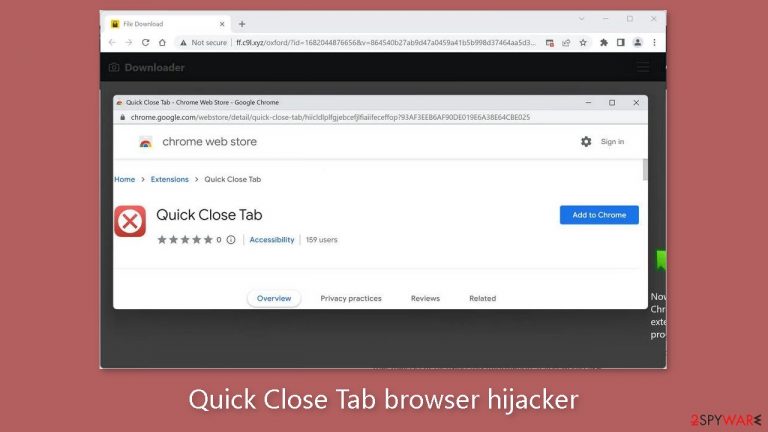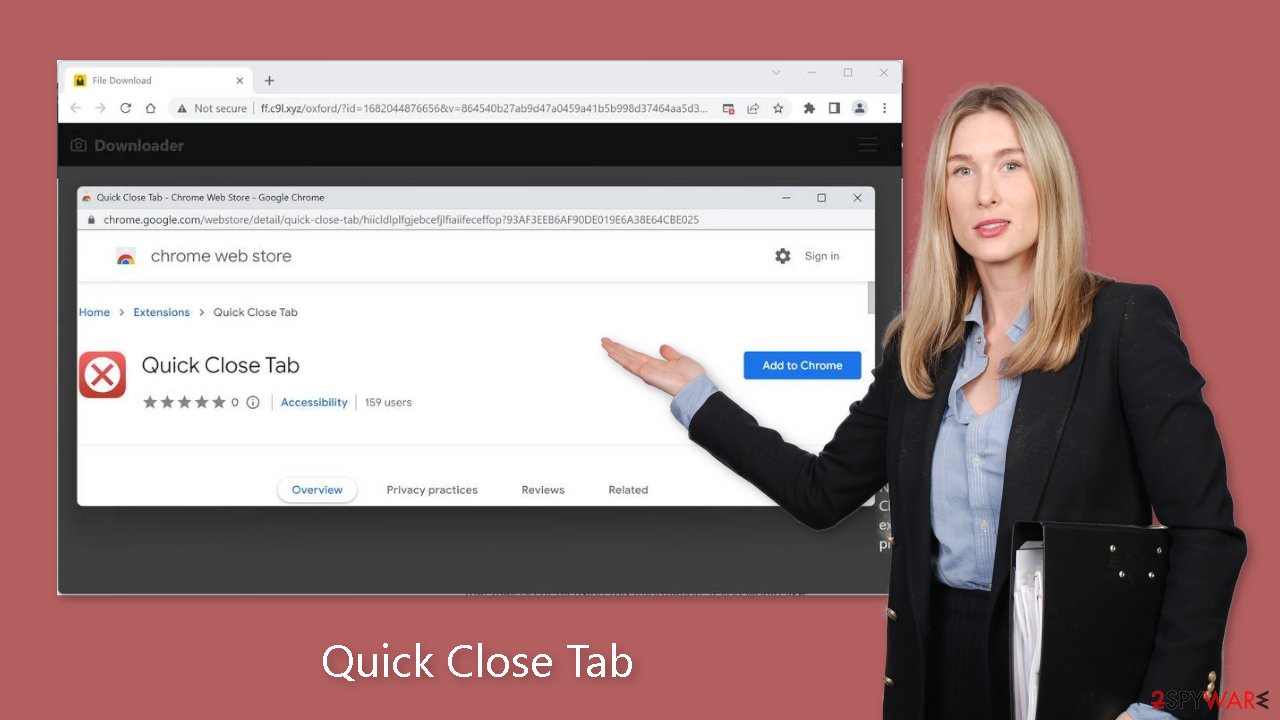Quick Close Tab adware (spam)
Quick Close Tab adware Removal Guide
What is Quick Close Tab adware?
Quick Close Tab is a browser extension with questionable functionality and ad spam

Quick Close Tab is a deceptive browser extension that claims to provide a useful feature of quickly closing browser tabs, but it actually contains adware.[1] This may result in an increase in commercial content such as pop-ups, banners, and redirects. Such applications' primary goal is to generate revenue for fraudsters.
Furthermore, the efficacy of the tab-closing function promised by such extensions is frequently called into question, and users may not receive the advertised benefits. Installing unnecessary third-party applications on your device is never a good idea.
To make matters worse, the Quick Close Tab extension may use deceptive advertising networks that redirect users to unsafe websites. As a result, people may become victims of scam pages, malicious sites that try to steal personal information, install potentially unwanted programs (PUPs),[2] or even malware.
| NAME | Quick Close Tab |
| TYPE | Adware |
| SYMPTOMS | Annoying pop-ups and other types of advertisements start appearing on the screen |
| DISTRIBUTION | Shady websites, deceptive ads, freeware installations |
| DANGERS | Links embedded in the ads might lead to dangerous websites |
| ELIMINATION | Eliminate the extension through your browser settings; scanning the machine with anti-malware tools is recommended |
| FURTHER STEPS | Use FortectIntego to get rid of any remaining damage and to optimize the machine |
Distribution methods
Because scammers frequently disguise their applications as useful tools, it is critical to conduct thorough research before installing any software. It is strongly advised to use official app stores, where apps are subjected to a rigorous review process. However, it's still a good idea to look at the reviews, ratings, and number of users.
Scammers may also create “official” promotional websites for their apps in order to attract unsuspecting victims. It is critical to remember that if something appears to be too good to be true, it most likely is. It is also critical to use safe browsing practices.
Avoid visiting suspicious websites and refrain from clicking on random links and ads, even if they appear to promote legitimate products and services. Unregulated websites are frequently filled with misleading ads and sneaky redirects, so stick to websites you are familiar with and trust.

Freeware installations
People frequently experience negative side effects after using freeware distribution platforms. Without your knowledge, Quick Close Tab adware may have infiltrated your device. To generate profit for the distributors, unsafe download channels frequently include additional programs in their installers.
Users typically do not benefit from bundled software. As a result, it is critical to maintain vigilance throughout the installation process. Always use the “Custom” or “Advanced” installation methods, read the Privacy Policy and Terms of Use carefully, and double-check the file list. The most important step is to uncheck the boxes next to any unrelated applications.
Remove Quick Close Tab adware
Quick Close Tab adware can be removed by going to the browser settings and looking at the extension list. We recommend removing plugins one by one to see if you notice any changes.
How to prevent from getting adware
Access your website securely from any location
When you work on the domain, site, blog, or different project that requires constant management, content creation, or coding, you may need to connect to the server and content management service more often. The best solution for creating a tighter network could be a dedicated/fixed IP address.
If you make your IP address static and set to your device, you can connect to the CMS from any location and do not create any additional issues for the server or network manager that needs to monitor connections and activities. VPN software providers like Private Internet Access can help you with such settings and offer the option to control the online reputation and manage projects easily from any part of the world.
Recover files after data-affecting malware attacks
While much of the data can be accidentally deleted due to various reasons, malware is one of the main culprits that can cause loss of pictures, documents, videos, and other important files. More serious malware infections lead to significant data loss when your documents, system files, and images get encrypted. In particular, ransomware is is a type of malware that focuses on such functions, so your files become useless without an ability to access them.
Even though there is little to no possibility to recover after file-locking threats, some applications have features for data recovery in the system. In some cases, Data Recovery Pro can also help to recover at least some portion of your data after data-locking virus infection or general cyber infection.
- ^ Adware. Malwarebytes. Cybersecurity Basics.
- ^ Potentially unwanted program. Wikipedia, the free encyclopedia.
- ^ Dusan Vasic. What Are Cookies? The Good and the Bad of Browser Cookies. Dataprot. Security Solutions.










